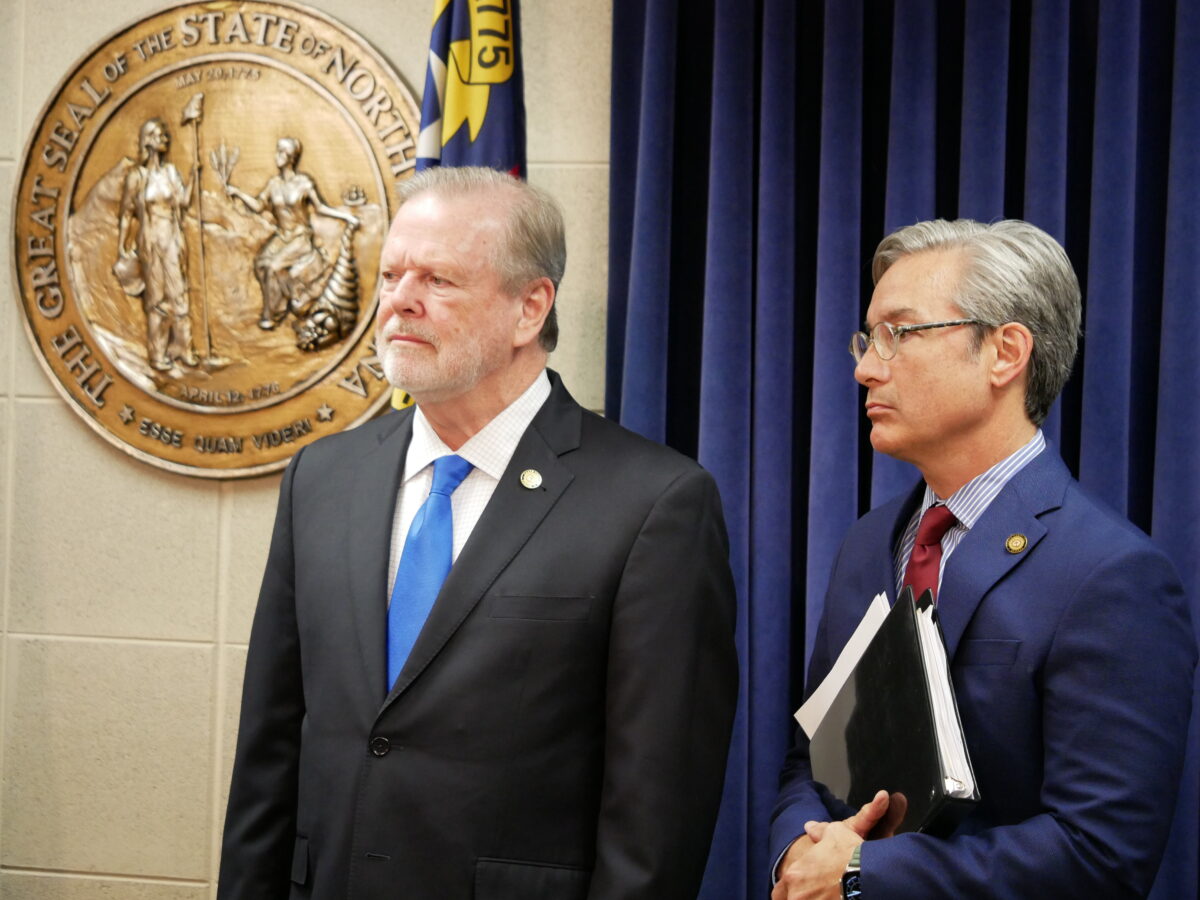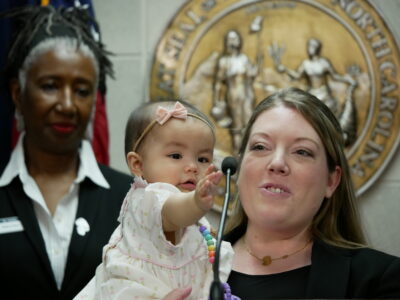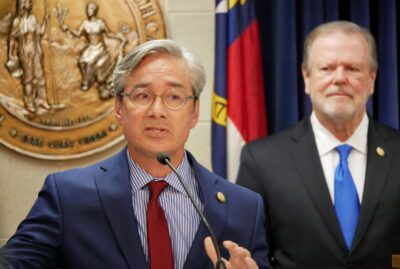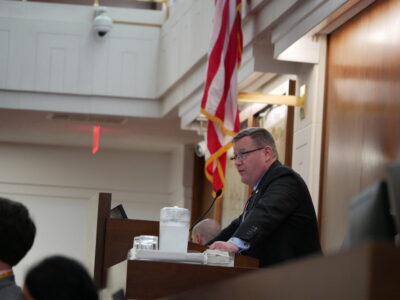
Share this story
- This year, because of the Republican supermajority and the deal on Medicaid expansion, it is unlikely the General Assembly won't pass a final budget. The 2023 budget conferees include six Democrats.
- While the Republican-led House and Senate appropriated comparable amounts in education overall, the House budget proposed much higher raises for teachers and other state employees. Now the two chambers must reach a compromise budget.
|
|
Now that both House and Senate Republicans have released and passed a budget proposal, the two chambers must work together to reach a compromise budget. Here are the lawmakers working on that proposal for how and where the state will allocate funds over the next two years.
This year, because of the Republican supermajority and the deal on Medicaid expansion, Democratic Gov. Roy Cooper’s budget proposal is less important for passing a budget. The 2023 budget conferees include six Democrats. Four of those members – Reps. Shelly Willingham, Cecil Brockham, Michael Wray, and Garland Pierce – have been swing votes already this legislative session.
The state started the budget process anticipating a $3.25 billion surplus. Last month, the Office of State Budget and Management (OSBM) and the General Assembly’s Fiscal Research Division issued a revised consensus revenue forecast predicting a slightly smaller surplus, down by $135.8 million, or a decrease of 0.4%.
Sign up for the EdWeekly, a Friday roundup of the most important education news of the week.
Historically, education is the largest area of the state budget – making up more than half of the total budget.
While the Republican-led House and Senate appropriated comparable amounts in education overall, the House budget proposed much higher raises for teachers and other state employees. That proposal included a 7.50% across-the-board pay raise for teachers over the biennium, with an average pay raise of 10.2% for teachers slated to get step increases.
Cooper’s budget included an average raise for teachers of 18% over the biennium and would have spent $3 billion more than the budget proposed by Republicans.
While Republican Senate leaders pointed to an average 4.5% pay increase, that number is not listed in their proposal.
Instead, beginning teacher pay is set to increase from $37,000 to $41,000 over the next two years, according to the budget proposal – an increase of 10.8%. The Senate proposal includes a raise of just $200 a month for teachers with 0-5 years of experience in 2023-24. This raise decreases with years of experience, until teachers with 14 years of experience or more would only receive $20 a month, essentially a 0% raise.
Meanwhile, the Senate budget radically expands school choice, adding more in recurring funding to expand private school vouchers through the Opportunity Scholarship Program over the biennium than it would add to implementing its proposed teacher salary schedule, by about $27 million.
With the additional allocations, the Senate’s revised net appropriation for the Opportunity Scholarship Grant Reserve is $636 million over the next two years. The budget also proposes an additional $11 million to fund additional vouchers in 2023-24 and removes all income eligibility requirements for recipients, starting with the 2024-25 school year.
Last month, in response to the budget proposals, Cooper declared a “state of emergency” for public education.
“This Republican Senate budget is a historic disaster for public education,” Cooper previously said of the proposal. “It fails to fund basic needs and will force school leaders to cut everything from bus routes to courses even though North Carolina can afford to do much more.”
The Senate budget does not include reinstating master’s pay, which was included in the House proposal.
The conference committee also will take up support for Canton, where the unexpected closure of the papermill will impact the town, the county, the school system, and the community college for at least the next five years.
About $60 million is needed to address the most critical needs and begin the economic recovery, according to local sources. Currently, Pactiv Evergreen, the owner of the mill, provides wastewater treatment, and at least $35 million will be needed to build a new wastewater treatment center.
Haywood Community College needs one-time capital funding of $6 million for the third and final phase of renovations to the Workforce and Industry Training Center, which will provide access to high-quality training opportunities for high-wage, in-demand careers in Haywood County and western North Carolina.
The additional funding needed for Canton would stabilize the town, county, school system, and community college over the biennium, while the future of the site becomes clear.
Workers at the mill also are facing a health care coverage crisis as previously reported.
The closing of the mill hits this town even harder because it was unanticipated and comes on the heels of 100-year historic flooding.
There are two representatives on the compromise budget committee that represent Haywood County, Sens. Kevin Corbin and Ralph Hise. You can read more of EdNC’s reporting on Canton here.
In addition, neither proposal includes new state funding for the continuation of compensation grants to child care programs – the priority item of the early childhood caucus this session.
Finally, neither the House or Senate explicitly funds the Leandro Plan, aimed at getting the state in line with its constitutional duties on education. Cooper’s plan included full funding of the plan. The General Assembly’s current shortfall for years two and three of the Leandro Plan is nearly $510 million, per an April court order.
Once the House and Senate conferees reach a compromise budget, the full General Assembly must pass it for it to become law. Due to the Republican supermajority and the inclusion of Medicaid expansion, it is highly unlikely for the General Assembly to not pass a budget this year.
You can read EdNC’s full coverage of the Senate proposal here, and the House proposal here.
Here is a list of the lawmakers working on the 2023 compromise budget proposal.
Senate members
- Sen. Brent Jackson, R-Bladen (Chair).
- Sen. Ralph Hise, R-Alleghany (Chair).
- Sen. Michael V. Lee, R-New Hanover (Chair). Lee is also a chair of the Senate education/higher education committee.
- President Pro Tempore Sen. Phil Berger, R-Guilford.
- Sen. Bill Rabon, R-Brunswick.
- Sen. Paul Newton, R-Cabarrus.
- Sen. Jim Perry, R-Beaufort.
- Sen. Todd Johnson, R-Cabarrus.
- Sen. David W. Craven, Jr., R-Anson. Craven is a member of the Senate education/higher education committee.
- Sen. Norman W. Sanderson, R-Carteret. Sanderson is a member of the Senate education/higher education committee.
- Sen. Tom McInnis, R-Cumberland. McInnis is a member of the Senate education/higher education committee.
- Sen. Vickie Sawyer, R-Iredell.
- Sen. Michael A. Lazzara, R-Onslow. Lazzara is a member of the Senate education/higher education committee.
- Sen. Amy S. Galey, R-Alamance. Galey is a chair of the Senate education/higher education and appropriations on education/higher education committees.
- Sen. Lisa S. Barnes, R-Franklin. Barnes is a chair of the Senate appropriations on education/higher education committee and member of the education/higher education committee.
- Sen. Dean Proctor, R-Caldwell. Proctor is a chair of the Senate appropriations on education/higher education committee.
- Sen. Carl Ford, R-Rowan.
- Sen. W. Ted Alexander, R-Cleveland.
- Sen. Steve Jarvis, R-Davidson.
- Sen. Joyce Krawiec, R-Forsyth.
- Sen. Jim Burgin, R-Harnett.
- Sen. Kevin Corbin, R-Cherokee. Corbin is a member of the Senate education/higher education committee.
- Sen. Danny Earl Britt, Jr., R-Hoke.
- Sen. Warren Daniel, R-Buncombe.
- Sen. Mike Woodard, D-Durham.
- Sen. Paul A. Lowe, Jr., D-Forsyth.
House members
- Rep. Donny Lambeth, R-Forsyth (Chair). Lambeth is also a member of the House K-12 and universities education committees.
- Rep. Dean Arp, R-Union (Chair).
- Rep. Jason Saine, R-Lincoln (Chair).
- Rep. John R. Bradford, III, R-Mecklenburg. Bradford is a member of the House community colleges education committee.
- Rep. Keith Kidwell, R-Beaufort.
- Rep. Mitchell S. Setzer, R-Catawba.
- Rep. Michael H. Wray, D-Halifax.
- Rep. Julia C. Howard, R-Davie. Howard is a member of the House universities education committee.
- Rep. Stephen M. Ross, R-Alamance.
- Rep. Steve Tyson, R-Craven. Tyson is a member of the House community colleges education committee.
- Rep. William D. Brisson, R-Bladen.
- Rep. Jeffrey Elmore, R-Alexander. Elmore is vice chairman of the House appropriations on education committee and a member of the K-12 and community colleges committees.
- Rep. John Faircloth, R-Guilford.
- Rep. Kyle Hall, R-Forsyth.
- Rep. Brenden H. Jones, R-Columbus.
- Rep. Wayne Sasser, R-Montgomery.
- Rep. Larry C. Strickland, R-Johnston. Strickland is a member of the House K-12 education committee.
- Rep. Kelly E. Hastings, R-Cleveland. Hastings is the vice chairman of the House education committee on universities.
- Rep. Jon Hardister, R-Guilford. Hardister is a chairman of the House appropriations on education and universities committees.
- Rep. John A. Torbett, R-Gaston. Torbett is a chairman of the House appropriations on education and K-12 education committees.
- Rep. David Willis, R-Union. Willis is a chairman of the House appropriations on education and community college committees, and a vice chairman of the K-12 education committee.
- Rep. George G. Cleveland, R-Onslow.
- Rep. Dennis Riddell, R-Alamance. Riddell is a member of the House K-12 education committee.
- Rep. Kristin Baker, M.D., R-Cabarrus. Baker is a member of the House universities education committee.
- Rep. Larry W. Potts, R-Davidson. Potts is a member of the House K-12 education committee.
- Rep. Donna McDowell White, R-Johnston. McDowell White is a member of the House community colleges education committee.
- Rep. Jake Johnson, R-Henderson. Johnson is a member of the House K-12 education committee.
- Rep. Ted Davis, Jr., R-New Hanover. Davis is a member of the House universities education committee.
- Rep. Dudley Greene, R-Avery.
- Rep. Charles W. Miller, R-Brunswick.
- Rep. Carson Smith, R-Onslow.
- Rep. Frank Iler, R-Brunswick. Iler is a member of the House K-12 education committee.
- Rep. Phil Shepard, R-Onslow. Shepard is a member of the House K-12 education committee.
- Rep. Shelly Willingham, D-Bertie.
- Rep. Cecil Brockman, D-Guilford. Brockman is a vice chairman of the House K-12 education committee and member of the appropriations on education committee.
- Rep. Garland E. Pierce, D-Hoke.
- Rep. Kevin Crutchfield, R-Cabarrus. Crutchfield is a member of the House universities education and appropriations on education committees.
- Rep. Matthew Winslow, R-Franklin.
- Rep. Jimmy Dixon, R-Duplin.
- Rep. Karl E. Gillespie, R-Cherokee.
- Rep. Edward C. Goodwin, R-Chowan.
- Rep. Hugh Blackwell, R-Burke. Blackwell is a chairman of the House K-12 education committee, vice chairman of the appropriations on education committee, and member of the community colleges education committee.
- Rep. Tricia Ann Cotham, R-Mecklenburg. Cotham is a chairman of the House K-12 education committee. She was elected as a Democrat last November and announced her party switch in April.
- Rep. Erin Paré, R-Wake.
- Rep. John R. Bell, IV, R-Wayne.
- Rep. Sarah Stevens, R-Surry.
- Rep. Destin Hall, R-Caldwell.
Correction: A previous version of this article incorrectly identified Rep. Michael Wray as a Republican. The story has been updated to reflect that Wray is a Democrat, and there are six total Democrats on the committee.
Recommended reading




